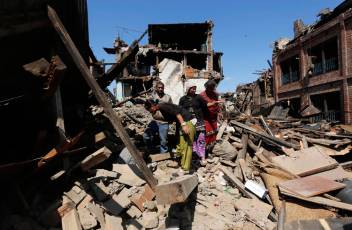 The day before the earthquake hit Nepal, I was in a town 20km to the east of the capital, Kathmandu.
The day before the earthquake hit Nepal, I was in a town 20km to the east of the capital, Kathmandu.
On the Saturday morning, the whole building began to shake. I thought it would stop as it normally does, but it kept shaking. I had to run outside.
All around me I saw buildings collapsing one by one. I was extremely shocked, as I had never experienced an earthquake like it.
People shouting for help
My first thought was to try and contact my family. I couldn’t get through to any of them, as all the networks were down.
I was really worried and decided to go back to Kathmandu. I headed back, but the roads were blocked. I could see big cracks in the roads as I was driving.
All along the side of the road, there were people crying. As I arrived in Kathmandu, there were crowds of people everywhere shouting for help.
Sleeping outside
People were trying to find shelter from the aftershocks, so they were all outside their homes.
Kathmandu is very crowded and there isn’t enough space for all the people who were standing out in the open.
I spent the whole of that day by the river because I thought I would be safe there from the aftershocks and collapsing buildings.
On the first night, I slept in a tent with 12 of my relatives. We managed to get some cushions and food from our houses. We’ve now been there for the past three nights.
Aftershocks continue
It’s four days since the earthquake, it’s started raining and there are still aftershocks.
The death toll has hit 5,000 but some say it will reach 10,000. Everyone is in shock and the rains that have started are adding to our troubles.
People are still sleeping outside in tents because they are scared of buildings collapsing. I don’t know when this will change as I’ve heard that aftershocks might continue for some time longer.
Food and water are scarce
There is little food and transport is very difficult. Our older people’s associations and some of our partners are in Kathmandu. There is limited network and coverage so communication is difficult, but we are in touch.
The general needs of all people, including older men and women are shelter, food and medical care.
People are being treated outside
The number of dead bodies is increasing rapidly and hospitals are running out of space.
Hospitals are treating people outside because they are scared of aftershocks and collapsing buildings.
The HelpAge team has met and we are planning how to respond and help older people.
The markets and shops are mostly closed and water is scarce. The government is distributing water in tanks but they don’t have enough for everyone.
How you can help
To support older people affected by the Nepal earthquake:
